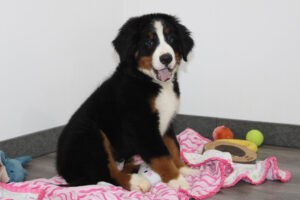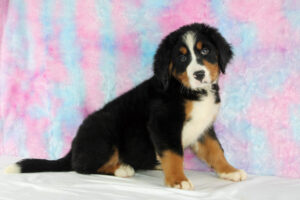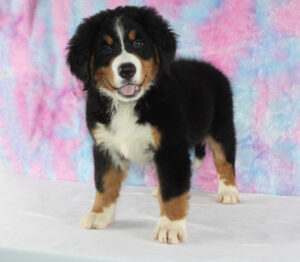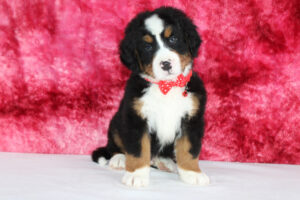

Blue Diamond Bernese Mountain Dod Early Development Training.
Every Blue Diamond Bernese Mountain Dog puppy goes through Early Neurological Stimulation (ENS). ENS is performed from day 3 to day 16 of the puppies life to get our puppies desensitized to human touch as well accustomed to different environments. All Blue Diamond Bernese Mountain Dog puppies are temperament tested by our Professional Puppy Trainer, Kimberly. She then writes each puppy’s individual descriptions based on their own unique temperament.
A Bernese Mountain Dog is an eager-to-please and hard-working dog. All our Berners are AKC registered. We strive to always breed to an OFA Hip Certified Male to get the best quality puppy on the market. Our puppies typically measure at the withers 25-27 inches high and weigh 75- 100 pounds. Males tend to be a little larger than females. The life expectancy of a Berner is 6-8 years. Sadly their lifespan is a little shorter than some other breeds but having a Bernese in your life is one of the best choices you will make!
Bernese Mountain Dog Attributes
Our Bernese Mountain Dogs are known for their loving, loyal, and gentle personalities. They are sometimes called a gentle giant. They very much live up to that term. A Berner is highly trainable and makes wonderful family pets. Because of their loyal nature, they also make great service dogs. A Bernese Mountain Dog requires at least 30 minutes of daily exercise to stay physically and mentally fit. Also, a moderate-protein diet will keep your puppy from growing too rapidly. Growing too fast can cause strain on the muscles and tendons and could be harmful to your puppy. Bernese Mountain Dogs tend to be prolific shedders but this can be limited with regular bathing and frequent brushing of their coat. In summary, Bernese Mountain Dogs are very devoted to their humans and make great companions for life!






History of Bernese Mountain Dogs
The Bernese Mountain Dog Breed, also known as the Berner Sennenhund or simply Berners, is a large, muscular breed of dog that was developed in the Swiss Alps. They are known for their thick, long coats, which are typically black with rust-colored markings on their legs, chest, and face.
Berners have a long history, with roots dating back to the Roman era. They were originally used as farm dogs, assisting with tasks such as herding cattle, pulling carts, and guarding livestock. They were also used for guarding and protecting the homes and families of farmers in the Swiss Alps.
In the late 19th and early part of the 20th century, Berners began to gain popularity as show dogs and companions. The breed was first recognized as a breed by the Swiss Kennel Club in 1907 and was subsequently recognized by other kennel clubs around the world.
Today, Berners are still popular as working dogs and family pets. They are known for their intelligence, loyalty, and gentle disposition and are often used as therapy dogs and search and rescue dogs. They are also popular in obedience and agility trials and are often shown in conformation shows.
Despite their popularity, Berners are still relatively rare and are considered a “vulnerable native breed” by the UK Kennel Club. This is largely due to their high demand and the fact that they are prone to certain health issues, such as hip dysplasia, which can be costly to treat.
What coat colors are Berners?
Bernese Mountain Dogs are known for their thick, long coats, which are typically black with rust-colored markings on their legs, chest, and face. The breed standard for Berners specifies that their coat should be black with “symmetrical rust and white markings.”
The rust-colored markings should be located on the cheeks, eyebrows, legs, and chest and should form an “equilateral cross” shape on the chest. The white markings should be located on the tip of the tail, the toes, and the chest.
Berners may also have small amounts of white on their muzzle, neck, or chest. However, the breed standard states that Berners should not have any white markings on their back or sides.
It is important to note that Berners are prone to coat changes as they age. Puppies are born with a coat that is lighter in color and shorter in length than the adult coat, and their coat may darken and lengthen as they mature. This is a normal process and is not considered a disqualification in the show ring.
What kind of coat do Bernese Mountain Dogs have?
Bernese Mountain Dogs have a thick, long, double coat that is ideal for protecting them from the cold temperatures and harsh weather conditions of the Swiss Alps, where they were originally developed. Their fur comprises a soft, dense undercoat and a longer, coarser outer coat.
The outer coat of a Berner is straight, thick, and shiny and is typically about 2 to 3 inches in length. The undercoat is soft, fluffy, and insulating, and helps to keep the dog warm in cold weather. The coat is heaviest on the neck, chest, and thighs and is slightly shorter on the head, ears, and legs.
Berners are known for their grooming needs, as their long coat requires regular brushing, bathing, and trimming to maintain their healthy appearance. They may also need to have their coat trimmed or shaved in the summer to help keep them cool.
Are Bernese Mountain Dogs Hypoallergenic?
Bernese Mountain Dogs are not hypoallergenic. Hypoallergenic dogs are breeds that are less likely to cause an allergic reaction in pet owners who are sensitive to dog allergens. However, Bernese Mountain Dogs are not considered hypoallergenic because they shed heavily and produce a significant amount of dander, which can trigger allergic reactions in some people.
Berners have a thick, long, double coat that requires regular grooming to maintain its healthy appearance. They tend to shed heavily, especially during the spring and fall seasons when they are shedding their old coat to make room for a new one. This shedding can result in a significant amount of dog hair being shed around the home, which can trigger allergic reactions.
In addition to shedding, Berners also produce dander, which is a type of skin flake that contains proteins that can trigger allergic reactions. Dander is produced by all dogs, but some breeds produce more dander than others. Berners are known to produce a moderate amount of dander, which can trigger allergic reactions in some people who are sensitive to dog allergens.
If you are allergic to dogs and are considering adopting a Berner, it is important to spend some time with the dog before making a commitment. This will allow you to determine if you are allergic to the dog and if you are able to live with the dog without experiencing symptoms. It’s important to keep in mind that no dog is completely hypoallergenic and that all dogs will produce some level of dander and shed some amount of hair.
How big do Berners get?
The Bernese Mountain Dog breed is a large breed that is known for its impressive size and muscular build. They are typically between 25 and 27.5 inches tall at the shoulder and weigh between 80 and 120 pounds.
The size of a Berner can vary depending on a number of factors, including genetics, diet, and exercise. Some Berners may be on the smaller side, while others may be larger. It is important to note that Berners are still growing until they are about two years old and may continue to fill out and gain muscle mass until they are fully mature.
Berners are considered a giant breed and are one of the largest breeds of dogs. They are larger than many other popular breeds, such as Labradors and Golden Retrievers, and are often mistaken for other large breeds, such as Great Danes or Mastiffs.
Despite their size, Berners are known for their gentle disposition and are often referred to as “gentle giants.” Their size can make them difficult to handle for some people, and they may not be the best choice for families with small children or individuals who are not physically able to handle a large dog.
Personality and Temperament of Bernese Mountain Dogs
Bernese Mountain Dogs are known for their calm, gentle, and affectionate personality. They are intelligent, loyal, and affectionate dogs that make great family pets. They are also known for their protective nature and will often bond closely with their families, becoming very protective of their homes and loved ones.
Berners are generally good with other dogs and pets but may be wary of strangers or unfamiliar dogs. They may bark to alert their owners to the presence of an intruder, but they are not typically aggressive or territorial.
Overall, Berners are loyal, loving, and gentle dogs that make great family pets. They are known for their calm, laid-back personality and are generally well-behaved dogs that are easy to live with.
What are the best grooming practices for Bernese Mountain Dogs?
Bernese Mountain Dogs are known for their thick, long coats, which require regular grooming to maintain their healthy appearance. Proper grooming is important for keeping their coat clean, healthy, and free of tangles and mats, and it can also help to prevent skin issues and parasites.
Some of the best grooming practices for Bernese Mountain Dogs include:
How much exercise do Berners need?
Bernese Mountain Dogs are a large, energetic breed that requires regular exercise to maintain their physical and mental health. They are known for their athleticism and enjoy activities such as hiking, jogging, and playing fetch.
As a general rule, Berners should get at least an hour of moderate to intense exercise every day. This can include activities such as walks, runs, or playtime in a fenced area. They may also enjoy activities such as swimming, obedience training, or agility training.
It is important to remember that Berners are still growing until they are about two years old, and their exercise needs may change as they mature. Puppies and young Berners may have higher exercise needs and may benefit from additional playtime and training. Older Berners may have lower exercise needs and may benefit from more moderate activity levels.
It is also important to consider the individual needs of your specific dog when determining its exercise requirements.
What’s the best type of training for your Bernese Mountain Dogs
Bernese Mountain Dogs are generally intelligent and trainable and respond well to positive reinforcement and rewards. They are sensitive dogs and may become anxious or fearful if subjected to harsh training methods, so it is important to use positive, reward-based training techniques when training a Berner.
Some of the best types of training for Bernese Mountain Dogs include:
Puppies and young Berners may have higher training needs and may benefit from additional socialization and obedience training. Older Berners may have lower training needs and may benefit from more advanced training activities.
You should always consult with a veterinarian or a professional dog trainer to determine the best training plan for your specific dog.
Can Bernese Mountain Dogs be registered?
Bernese Mountain Dogs can be registered with several kennel clubs and dog breed registries around the world. Registration is a process that involves documenting the pedigree and history of a dog and is typically done for breeding and show purposes.
In the United States, Berners can be registered with the American Kennel Club (AKC), which is one of the largest and most well-known kennel clubs in the country. To be eligible for AKC registration, Berners must be purebred and must meet the breed standard as established by the AKC.
In addition to the AKC, Berners can also be registered with other kennel clubs and breed registries, such as the Canadian Kennel Club (CKC), the United Kennel Club (UKC), and the International All Breed Canine Association (IABCA).
Registration does not guarantee the quality or health of a dog and does not necessarily mean that a dog is purebred. It is important to do thorough research and to choose a reputable breeder like Blue Diamond Family Pups when looking for a Berner or any other breed of dog.
Does Berners make good therapy dogs?
Bernese Mountain Dogs are known for their calm, gentle, and affectionate personality, which can make them well-suited for therapy work. They are intelligent, loyal, and patient dogs that are often used as therapy dogs to visit hospitals, nursing homes, and other facilities to provide comfort and companionship to people in need.
To be eligible to work as a therapy dog, Berners must undergo specific training and certification. This typically involves passing a temperament test, completing obedience training, and obtaining certification from a recognized therapy dog organization.
Therapy dogs play an important role in the lives of many people and can provide a source of comfort and support to those who are facing physical, emotional, or mental challenges. Berners are often well-suited for this type of work due to their calm and gentle disposition and their ability to form strong bonds with their handlers.
It is important to note that therapy work is not suitable for all dogs and that not all Berners are well-suited for this type of work. You should consult with a veterinarian or a professional dog trainer to determine if your specific dog is a good candidate for therapy work.
Are Bernese Mountain Dogs a good breed for families with kids and pets?
Bernese Mountain Dogs are generally good with children and are patient and gentle with them. However, due to their size, they may not be the best choice for families with very small children or individuals who are not physically able to handle a large dog.
Berners are also generally good with other dogs and pets but may be wary of strangers or unfamiliar dogs. They may bark to alert their owners to the presence of an intruder, but they are not typically aggressive or territorial.
It is important to remember that all dogs, including Berners, need to be properly socialized and trained to get along with children and other pets. It is also important to also teach children how to behave around dogs and to supervise their interactions to ensure the safety of both children and pets.
Overall, Bernese Mountain Dogs can be a good breed for families with kids and pets as long as they are properly socialized, trained, and supervised. They are loyal, affectionate dogs that make great family pets and are known for their calm, gentle disposition. However, it is a good idea to consider the individual needs and personalities of your specific dog and your family when determining if a Berner is a right breed for you.
The life span of Bernese Mountain Dogs!
The life span of a Bernese Mountain Dog is typically between 6 and 8 years. This is relatively short compared to many other breeds of dog and is due in part to the breed’s susceptibility to certain health issues.
The life span of a Berner can vary depending on a number of factors, including genetics, diet, exercise, and overall health. Some Berners may live longer than the average lifespan, while others may have shorter lifespans due to health issues or other factors.
To get the most time with your Berner, it is really important to feed them a high-quality diet, provide them with regular exercise, and keep up with their preventive healthcare, including vaccinations, check-ups, and screenings. It is also important to monitor their health and to seek medical attention if you notice any changes in their behavior or appearance.
How young can I get my Bernese Mountain DogsPuppy?
It is generally recommended to wait until a Bernese Mountain Dog puppy is at least eight weeks old before taking them home. At eight weeks of age, puppies have typically been weaned from their mother’s milk and are ready to eat solid food. They are also more socialized and better able to cope with the stresses of a new environment.
Taking a puppy home before they are 8 weeks old can be risky, as it may not be fully immunized and may be more susceptible to illness or infection. It is also important to remember that puppies are still developing and learning at this age and need to be with their mothers and littermates to learn important social skills.
It is a good idea to do thorough research and choose a reputable breeder like Blue diamond Family Pups when looking for a Bernese Mountain Dog puppy. A reputable breeder like Blue Diamond Family Pups can provide you with information about the puppy’s health, temperament, and pedigree and will be able to answer the questions you may have regarding the breed.
You should be prepared for the time, commitment, and expense of raising a puppy. Puppies require a lot of care and attention, including feeding, training, socialization, and healthcare. It is essential to be prepared for the responsibilities of owning a dog before bringing a puppy home.